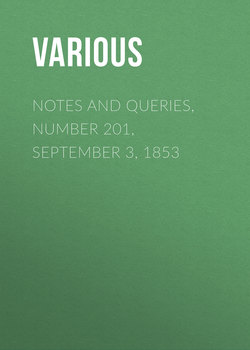Читать книгу Notes and Queries, Number 201, September 3, 1853 - Various - Страница 3
Notes
FOLK LORE
ОглавлениеSuperstition of the Cornish Miners (Vol. viii., p. 7.).—I cannot find the information desired by your correspondent in the Cornish antiquaries, and have in vain consulted other works likely to explain this tradition; but the remarks now offered will perhaps be interesting in reference to the nation alluded to. The Carthaginians being of the same race, manners, and religion as the Phœnicians, there are no particular data by which we can ascertain the time of their first trading to the British coast for the commodity in such request among the traders of the East. The genius of Carthage being more martial than that of Tyre, whose object was more commerce than conquest, it is not improbable that the former might by force of arms have established a settlement in the Cassiterides, and by this means have secured that monopoly of tin which the Phœnicians and their colonies indubitably enjoyed for several centuries. Norden, in his Antiquities of Cornwall, mentions it as a tradition universally received by the inhabitants, that their tin mines were formerly wrought by the Jews. He adds that these old works are there at this day called Attal Sarasin, the ancient cast-off works of the Saracens, in which their tools are frequently found. Miners are not accustomed to be very accurate in distinguishing traders of foreign nations, and these Jews and Saracens have probably a reference to the old merchants from Spain and Africa; and those employed by them might possibly have been Jews escaped the horrors of captivity and the desolation which about that period befel their country.
"The Jews," says Whitaker (Origin of Arianism, p. 334.), "denominated themselves, and were denominated by the Britons of Cornwall, Saracens, as the genuine progeny of Sarah. The same name, no doubt, carried the same reference with it as borne by the genuine, and as usurped by the spurious, offspring of Abraham."
Bibliothecar. Chetham.
Northamptonshire Folk Lore (Vol. vii., p. 146.).—In Norfolk, a ring made from nine sixpences freely given by persons of the opposite sex is considered a charm against epilepsy. I have seen nine sixpences brought to a silversmith, with a request that he would make them into a ring; but 13½d. was not tendered to him for making, nor do I think that any threehalfpences are collected for payment. After the patient had left the shop, the silversmith informed me that such requests were of frequent occurrence, and that he supplied the patients with thick silver rings, but never took the trouble to manufacture them from the sixpences.
A similar superstition supposes that the sole of the left shoe of a person of the same age, but opposite sex, to the patient, reduced to ashes is a cure for St. Anthony's fire. I have seen it applied with success, but suppose its efficacy is due to some astringent principle in the ashes.
E. G. R.
